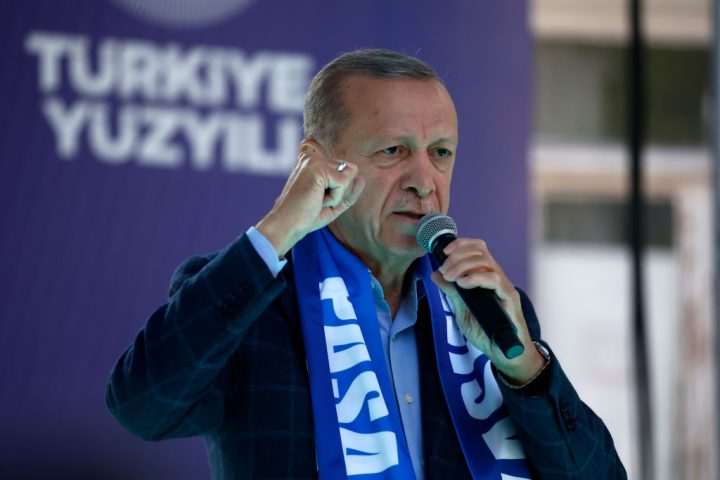The Turkish election is just hours away, and an opposition victory seems more likely than ever under president Erdogan’s rule. Everywhere from cafés to the civil service, from social media to newspapers, the big question on everyone’s lips is whether Erdogan will concede after 21 years in power. Fears of escalation and violence on the streets are high.
As Turkey’s electoral system is old-fashioned and analogue, irregularities and small-scale fraud are common, especially in rural areas. However, the system leaves little to no room for mass election fraud.
Losing an election does not necessarily mean the end of a strongman
In the 2019 local elections, the opposition Republican People’s party (CHP) won in Istanbul by a small margin of a few thousand votes. Losing the country’s biggest city was symbolically significant, as Erdogan himself once stated, ‘The one who wins Istanbul, wins in Turkey’. Erdogan’s Justice and Development party (AKP) contested the legitimacy of the results, calling for a rerun, which the Supreme Election Council complied with. In the second round, the opposition won by a landslide.
While citing this example, the possibility of President Erdogan legally challenging the results is often brushed off. As eroded as democratic institutions may be in Turkey, Turks do like a fair election – even AKP voters. The 2019 local elections were a clear indication of that.
However, when Erdogan tried and failed to maintain control of Istanbul, a different anti-democratic method was successfully implemented in the Kurdish southeast after the same local elections. There, the pro-Kurdish People’s Democratic party (HDP) gained control of most municipalities. In the following months, the Ministry of Interior forcibly removed several dozen democratically elected mayors, citing terrorism charges, and replaced them with government-appointed trustees.
The second, and most feared, option of Erdogan clinging onto power in case of an opposition victory is using brute force. The government’s messaging has been unsettling. The Minister of Interior, responsible for the country’s security, has called the upcoming elections ‘a coup attempt’. Such statements have reminded many of Donald Trump’s attempts to muddy the election results in advance during the 2020 campaign.
Erdogan’s alliance has no shortage of muscle to mobilise on the streets. His main coalition partner, the Nationalist Movement party (MHP), has the Grey Wolves, a paramilitary organisation present across the country. In 2021, the European Parliament called on member states to designate the group as a terrorist organisation. Furthermore, MHP has well-documented links to various ultra-nationalist mafia groups.
In the Kurdish southeast, President Erdogan formed an alliance with the Kurdish-nationalist and Islamist HUDA PAR. While the party has less than 1 per cent support among the electorate, their armed wing, Hezbollah (not to be confused with the Shia militant group of the same name in Lebanon), constitutes considerable manpower in the southeast. Just days after HUDA PAR joined AKP’s alliance, 58 Hezbollah militants responsible for at least 183 assassinations were released from prison.
Last but not least, there is the private military company SADAT, which has been instrumental in aiding Ankara’s military adventures in the Syrian and Libyan civil wars. Last year, the opposition’s joint presidential candidate, Kemal Kilicdaroglu, openly called the company a ‘paramilitary organisation that could threaten the security of the election’, pointing out that they conduct ‘guerrilla warfare training’.
At the end of the day, the most critical point will be the stance of the military. Historically, the Turkish Armed Forces have conducted several coups when the democratic process got out of control. After the 2016 botched coup attempt by the Gulen movement, AKP’s former allies, Erdogan purged tens of thousands of soldiers and officers.
It is impossible to know exactly to what extent Erdogan has control over the armed forces today. But despite the purge, the recent earthquake and the government’s decision to mobilise the army only on the third day indicate Erdogan’s insecurity regarding the military. Ismail Saymaz, a prominent local journalist, claimed that ‘fighter jet pilots on duty are being guarded by armed members of the presidential bodyguards’ – again suggesting Erdogan’s fear of a potential military intervention against his government.
Challenging the opposition’s victory legally or by force carry major risks for Erdogan but cannot be ruled out. The most likely option for him to maintain power if the opposition wins is to concede and wait for the new government to fail. Even if Kilicdaroglu is elected as president, AKP’s People’s Alliance would probably be the strongest alliance in parliament. In order to get anything through parliament, Kilicdaroglu’s CHP will have to get their ultra-nationalist IYI party and the socialist pro-Kurdish HDP on board. Successful cooperation in parliament between such groups would be little short of a miracle.
If the opposition wins, they would inherit a crippled economy currently on life support from political sympathisers of Erdogan in the Gulf states and the Kremlin. Replacing this eastern capital with western investments, tackling inflation, and ending the current cost of living crisis would take years. Harsh austerity measures and not meeting their optimistic election promises could lead to a sharp drop in their support among the electorate.
Losing an election does not necessarily mean the end of a strongman, as seen with Israeli Prime Minister Benjamin Netanyahu in 2022. Erdogan could go into opposition and use his influence in the civil service and the economy to undermine the new government’s success. Despite his age and apparent physical weakness, he remains the most dominant and influential persona in Turkish politics.






Comments